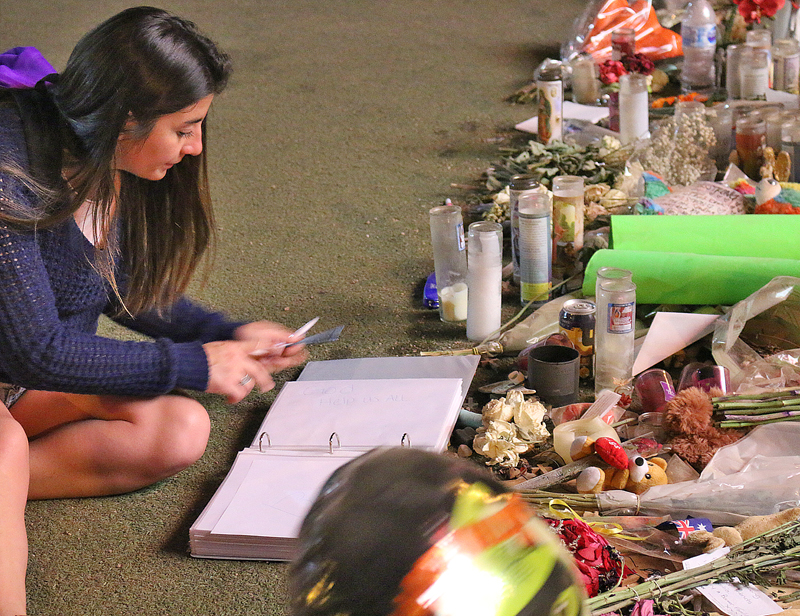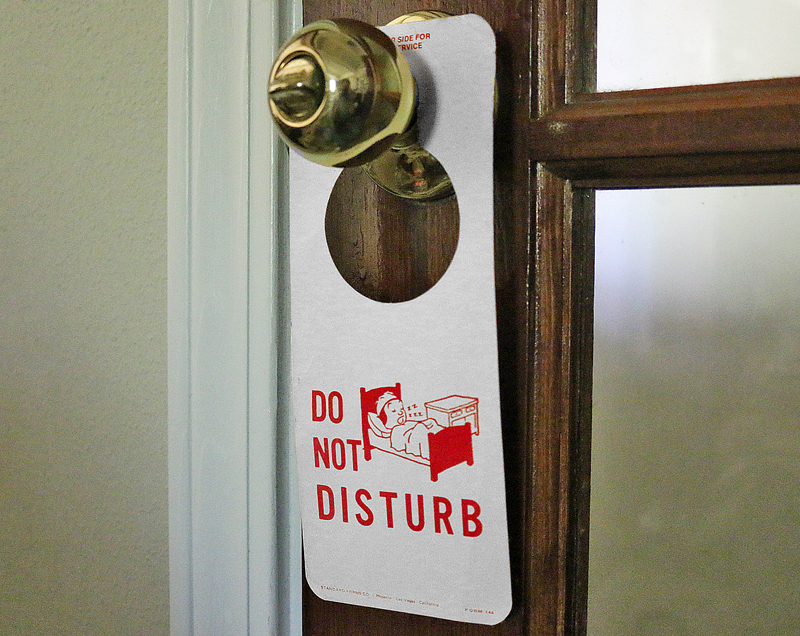After a long day of work or sightseeing, there is nothing like repairing to the tranquility of a hotel room, where you can shower, read, and sleep…
…and when you are traveling for at least a week, sometimes taking one day off and just spending it in your hotel room is exactly the way to recharge yourself for the rest of your trip. Simply hang the Do Not Disturb sign outside of your locked door to create your bastion for uninterrupted peace and quiet in your sanctuary — right?!?
Not quite.
Room Checks: Should Privacy Be Sacrificed For Security at Hotels?
In what is being considered one of the deadliest mass shootings in American history during which 58 people were killed and 851 more people sustained injuries — 429 of them from the panic which resulted after the massacre — Stephen Paddock launched rampant consecutive rounds of gunfire from his room on the 32nd floor of the Mandalay Bay Las Vegas hotel just after 10:05 in the evening on the night of Sunday, October 1, 2017. Paddock — who was 64 years old and a resident of Mesquite — started the rampage just after Jason Aldean took the stage and began performing one of his songs at the Route 91 Harvest Festival diagonally across Las Vegas Boulevard.

Since the attack — in order to supposedly prevent future hotel rooms from becoming arsenals of weapons and preventing another inexplicable mass killing from happening — some lodging companies and independent hotel and resort properties have adopted policies to implement what are known as room checks. This generally means that a member of the housekeeping staff or security staff can enter a hotel room every 12 hours to every 48 hours without permission by the guest — whether or not he or she is occupying the room; and despite any indication by the guest not to disturb the room.
More specifically, a member of the housekeeping staff may enter the room under the guise of routine cleaning — and a member of the security staff of the hotel may enter the room if the do not disturb sign has been out for too long; if the guest is engaging in suspicious behavior; or if there has been no activity in the room for a certain length of time as three of a number of justifications for entering the room without express permission by the guest.
Caesars Entertainment, Hilton Hotels and Resorts, MGM Resorts, Boyd Gaming and Wynn Resorts are some of the lodging companies and independent hotel and resort properties which have reportedly implemented the policy of checking rooms on a regular and more frequent basis; and the policy can vary by hotel or resort property.
In order to ensure that its room check policy is as clear to guests as possible, The Walt Disney Company swapped out its Do Not Disturb signs to Room Occupied tags at its higher-end resort properties, effective as of the end of 2018. Hyatt Hotels Corporation reportedly followed suit in order to better manage guest expectations.
Examples of the Negative Outcome of the Room Check Policy
Members of the housekeeping staff of the Hyatt Regency Mission Bay hotel property in San Diego have reportedly been showing up at 8:00 in the morning every day and knocking on the door of the room occupied by FlyerTalk member CloneCones for the purpose of conducting what is apparently called a “wellness check” of the room — despite having the Do Not Disturb sign hanging outside of the door. “I don’t want house keeping or anyone rooting through my stuff”, posted CloneCones. “With all the ‘green’ policies you would think it’s a welcome sight but not here.”
Despite responding “no thanks” to the person knocking on the door and saying “housekeeping”, the person knocks on the door again and says “security wellness check” instead of leaving CloneCones alone. “The first time they said it was state law and I called them out on that since I’ve stayed 50 nights in California in various hotels in 2019 alone and never had to deal with this. Now they say it’s policy.”
Because of this “ridiculous” policy, CloneCones will not stay at that hotel property again “purely for this annoyance.”
Knocking on the hotel room door is not the only way employees of hotel and resort properties are doing room checks. “I’ve had the ‘privacy please’ sign up the entire time at my current Hyatt Regency stay”, FlyerTalk member wackyducky reported. “They called my cell phone on day 11 of 13 asking if there was anything I needed. Probably checking to see if I was still breathing. Don’t know if they’ve tried to enter the room.”
FlyerTalk member meducate experienced the room check policy recently as well. “I had the DND sign on the door, the room had already been serviced and the staff had seen me, and while I was out at dinner, housekeeping entered the room and provided turn down service. I found this totally unacceptable.”
Even worse, attendees of Def Con and Black Hat supposedly felt the full brunt of the room check policy of Caesars Entertainment hotel and resort properties, as the “attendees who stayed at the Mandalay Bay, Luxor, Caesars Palace, Flamingo, Aria, Cromwell, Tuscany, Linq, Planet Hollywood, or Mirage said hotel security officers showed nothing to verify their identify, actually did more than a visual inspection (such as by photographing and filming rooms), went so far as to confiscate items, and some claim they even riffled through their bags”, according to this article which was posted at CSO. “While it is worth noting that hotel security denied confiscating anything, there were reports of hotel security officers confiscating soldering irons and lockpicks. Ars Technica was told that some conference attendees ‘have audio and video recordings of two of the Caesars security staff photographing and video recording our private rooms. What was the most troublesome about all of this was the fact the security staff had made mention during the search that they intended to share the photos that they were taking on Snapchat.’”
A statement was issued from Caesars Entertainment via Twitter with regards to the accusations.
A whole lot of @defcon participants staying at Caesar's, where the con is held, have complained that hotel staff entered their rooms without permission (hackers tend to be a paranoid people, and protective of their stuff). Here's the hotel's statement.https://t.co/5kBnDHkFHp pic.twitter.com/2uwDknthQO
— Kevin Collier (@kevincollier) August 12, 2018
These experiences conjure up a number of questions. Is the room check a new way for some members of the housekeeping staff to finish their days as soon as possible instead of waiting until the guests grant permission to access the rooms? What is to stop an employee of a hotel or resort property from entering the room and rifling through — and perhaps even confiscating — the personal belongings of a guest as part of a room check? Do employees at hotel and resort properties have the right to enter the room of a guest anytime they want; or did the guest pay for the right to privacy which — except for obvious exceptions — should supersede the room check policy of a hotel or resort property?
Most importantly of all: does a room check policy actually serve a real purpose? Are the security policies of hotel and resort properties more closely emulating those of security checkpoints at airports?
FlyerTalk member lighthouse206 has an interesting perspective: “Yeah I don’t get the paranoia about this. They have every right to make sure you aren’t doing something nefarious in their room. It’s not like a hotel room BELONGS to you… it BELONGS to them, and you are simply renting it for a brief period. If you owned it, that would be different, but you don’t. A similar concept exists with apartments in most states: the landlord always has the right (with some limitations on notice) to enter the apartment for really any reason, including to make sure you aren’t trashing the place.”
Do you agree with lighthouse206?
What About the Safety of Members of the Hotel Staff?

One way to arouse suspicion is to keep the door of a hotel room ajar. When Jesus Campos went to the room of Stephen Paddock to investigate an alert of an open door on that fateful night, the employee of the Mandalay Bay Las Vegas hotel property could not open the door which provided immediately access to the 32nd floor because it was fastened shut with a bracket. After hearing the sound of rapid gunfire emanating from room 32-135, Campos was shot in the right thigh by Paddock with one of the 35 bullets which were fired through the door.
Regardless of the situation, what is to prevent a member of the housekeeping staff or a member of the hotel security staff from sustaining injury — or even death — as the result of disturbing a guest? How are they protected?
Summary

“Those who would give up essential Liberty, to purchase a little temporary Safety, deserve neither Liberty nor Safety” is a quote often attributed to Benjamin Franklin.
Based on that statement, I am personally not convinced that the room check policy the way to go, as I do not support the idea of voluntarily giving up what little privacy I may have left in this world in order to purportedly be more safe and secure. I am also skeptical that room checks will work 100 percent of the time as intended — or even a fraction thereof — leaving me to wonder if room checks can really be justified.
Remember that the situation on the night of October 1, 2017 was a crowded outdoor concert across a busy boulevard from a hotel property with hundreds of hotel rooms which is high enough to give an ideal vantage point to commit mayhem. That is not a typical situation at most hotel and resort properties on any given day.
What about the security cameras with which many hotel and resort properties are equipped? I would think that at least one person constantly monitoring the combination of outdoor, lobby, elevator, stairwell and hallway security cameras should be sufficient enough to alert management of hotel and resort properties to any suspicious activity…
…and speaking of cameras, does the tenet of increased security trump the right to privacy? Are we once again going to allow the precedent of the actions of a few set the standard for everyone else? What comes next — biometric technology at hotel and resort properties?
We deal with risk every day of our lives. At times, I believe that we pay way too much credence to the advent of security and safety; and if it is only achieved by significantly sacrificing the right to privacy and the idea of freedom, I would rather take my chances…
All photographs ©2017, ©2018 and ©2019 by Brian Cohen.

